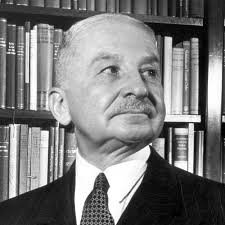
“All rational action is in the first place individual action. Only the individual thinks. Only the individual reasons. Only the individual acts.”
“Used to the conditions of a capitalistic environment, the average American takes it for granted that every year business makes something new and better accessible to him. Looking backward upon the years of his own life, he realizes that many implements that were totally unknown in the days of his youth and many others which at that time could be enjoyed only by a small minority are now standard equipment of almost every household. He is fully confident that this trend will prevail also in the future. He simply calls it the American way of life and does not give serious thought to the question of what made this continuous improvement in the supply of material goods possible.”
“The consumers suffer when the laws of the country prevent the most efficient entrepreneurs from expanding the sphere of their activities. What made some enterprises develop into big business was precisely their success in filling best the demand of the masses.”
“Those politicians, professors and union bosses who curse big business are fighting for a lower standard of living.”
Who said all of these things? One of the greatest economists of the twentieth century: Ludwig von Mises, author of Human Action, Planned Chaos, Socialism, and The Anti-Capitalistic Mentality (among many other titles). His works and ideas are ignored by the cultural establishment of our time, and by our President, Congress and Federal Reserve most of all. Yet those ideas are desperately needed for the twenty-first century.
Consider the latest headline: “Dow Plunges 318 Points on Fears of Slower Growth.”
Presumably, the Obama Administration has “stabilized” the economy. Anti-capitalist economists (in both parties) consider this a good thing. But if you think about it, stabilizing merely means … slowing growth or holding still. That’s not what generations of Americans are accustomed to, as von Mises’ quote on the average American consumer points out.
It turns out that the Obama policies of wealth redistribution, high taxation and unprecedented, massive and unlimited federal debt didn’t even hold things still. Why? Because, the experts are telling us, Wall Street investors are worried about slow growth in the Chinese economy, as well as other nations that didn’t used to matter, such as Argentina and Turkey, of all places.
The Chinese economy is a state-run enterprise. It’s a fascist system which allows for some nominal or pseudo-private ownership so that profit-making entities may service the political agenda of the ruling Communist Party. It’s nothing more than a collective of politicized cartels overseen by a ruling, dogmatic elite permitting no individual or political rights to the citizens. Government is the ruler of the Chinese economy, just as government increasingly rules the American economy. That trend began before Obama, but has dramatically accelerated under his rule.
It’s an economic slowdown in such a country as China that now has Wall Street in another slide. Is this what the American economy has come to? Dependence on the well-being of a fascist, pseudo-capitalist dictatorship? America used to lead the way. Now it’s dependent on the well-being of China in order to remain “stable”–i.e., frozen in place. If America were still a mostly free market, truly capitalist economy, China would be looking to our well-being, not the other way around.
In America, unlike anywhere else on earth, we take it for granted that economic prosperity will continue, and innovation will continue decade after decade. But nobody stops to question why this constant progress in human material well-being has never existed anywhere else other than in America.
Doesn’t the fact that economic growth is the rare exception, rather than the norm, of human history tell us something? Doesn’t it suggest that such well-being is not guaranteed, is not inevitable, and is not an American “birthright” as ignorant, even arrogant, masses of citizens now seem to feel?
Thinkers such as von Mises explained the economy quite well, in both abstract, generalized terms as well as economic specifics. The American founders (with the help of economist Adam Smith) understood much of it implicitly.
The only ones still in the dark about capitalism are the morons we’ve put in charge of the sheep that too many of us have become.
Be sure to “friend” Dr. Hurd on Facebook. Search under “Michael Hurd” (Rehoboth Beach DE). Get up-to-the-minute postings, recommended articles and links, and engage in back-and-forth discussion with Dr. Hurd on topics of interest.
